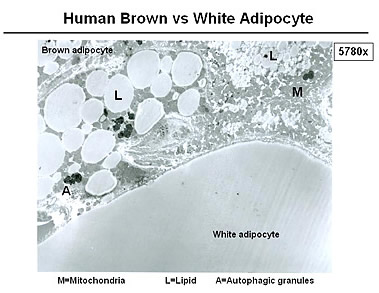
A study published in Diabetologia, Oct. 10, 2011 shows that activating brown adipose tissue through targeted inhibition of the cannabinoid receptor 1(CB1),could effectively reduce body weight and blood glucose by increasing calorie burning in brown adipose tissue.
CB1 receptor antagonists were previously used in human weight loss drugs offered in Europe but were taken off the market due to significant neurologic side effects like depression.

The study examined the physiological mechanisms by which CB1 antagonism improves glucose metabolism and insulin sensitivity independent of its anorectic and weight -reducing effects, as well as the effects of CB1 antagonism on brown adipose tissue (BAT) function. Chronic CB1 antagonism markedly enhances insulin-mediated glucose utilisation in DIO (Diet Induced Obese) mice, independent of its anorectic and weight-reducing effects. The potent effect on insulin-stimulated BAT glucose uptake reveals a novel role for CB1 receptors as regulators of glucose metabolism.

"CB1 antagonists still hold promise for fighting obesity and diabetes -- the challenge is finding one that does not engage the receptors in areas of the brain that control mood and still maintains its enormous calorie-burning properties.

"Our findings suggest that the capacity of brown adipose tissue to burn calories and consume glucose is impaired in obesity and type 2 diabetes. If we could find an effective and safe way to reactivate the brown adipose tissue's calorie-burning properties, this could represent a breakthrough in the search of more effective drugs against obesity and diabetes, Said Silvana Obici, MD at the UC Metabolic Diseases Institute.

